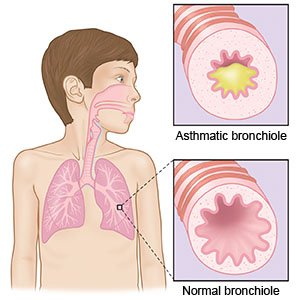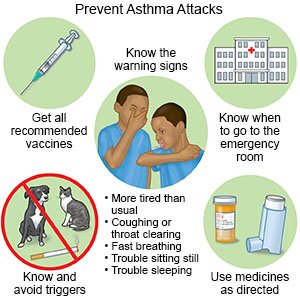Asthma in Children
Medically reviewed by Drugs.com. Last updated on Apr 2, 2024.
Asthma is a condition that causes breathing problems. Inflammation and narrowing of your child's airway prevents air from getting to his or her lungs. An asthma attack is when your child's symptoms get worse. If your child's asthma is not managed, symptoms may become chronic or life-threatening.
 |
DISCHARGE INSTRUCTIONS:
Call your local emergency number (911 in the US) if:
- Your child has severe shortness of breath.
- The skin around your child's neck and ribs pulls in with each breath.
- Your child's peak flow numbers are in the red zone of his or her AAP.
Seek care immediately if:
- Your child has shortness of breath, even after he or she takes short-term medicine as directed.
- Your child's lips or nails turn blue or gray.
Call your child's doctor or asthma specialist if:
- You run out of medicine before your child's next refill is due.
- Your child's symptoms get worse.
- Your child needs to take more medicine than usual to control his or her symptoms.
- You have questions or concerns about your child's condition or care.
Medicines:
Medicines may be given to decrease inflammation, open your child's airway, and make breathing easier. Other medicines may be needed if your child's regular medicines are not able to prevent attacks. Asthma medicine may be inhaled, taken as a pill, or injected. Your child may need any of the following:
- A long-acting inhaler works over time to prevent attacks. It is usually taken every day. A long-acting inhaler will not help decrease symptoms during an attack.
- A rescue inhaler works quickly during an attack.
- Allergy shots or allergy medicine may be needed to control allergies that make symptoms worse.
- Give your child's medicine as directed. Contact your child's healthcare provider if you think the medicine is not working as expected. Tell the provider if your child is allergic to any medicine. Keep a current list of the medicines, vitamins, and herbs your child takes. Include the amounts, and when, how, and why they are taken. Bring the list or the medicines in their containers to follow-up visits. Carry your child's medicine list with you in case of an emergency.
Follow your child's Asthma Action Plan (AAP):
An AAP is a written plan to help you manage your child's asthma. It is created with your child's pediatrician. Give the AAP to all of your child's care providers. This includes your child's teachers and school nurse. An AAP contains the following information:
- A list of what triggers your child's asthma
- How to keep your child away from triggers
- When and how to use a peak flow meter
- What your child's peak numbers are for the Green, Yellow, and Red Zones
- Symptoms to watch for and how to treat them
- Names and doses of medicines, and when to use each medicine
- Emergency telephone numbers and locations of emergency care
- Instructions for when to call the doctor and when to seek immediate care
Treatment options
The following list of medications are related to or used in the treatment of this condition.
Manage your child's asthma:
 |
- Keep a diary of your child's asthma symptoms. This will help identify asthma triggers so you can keep your child away from them.
- Do not smoke near your child. Do not smoke in your car or anywhere in your home. Do not let your older child smoke. Nicotine and other chemicals in cigarettes and cigars can make your child's asthma worse. Ask your child's pediatrician for information if you or your child currently smoke and need help to quit. E-cigarettes or smokeless tobacco still contain nicotine. Talk to your child's pediatrician before you or your child use these products.
- Manage your child's other health conditions. This includes allergies and acid reflux. These conditions can make your child's symptoms worse.
- Ask about vaccines your child may need. Vaccines can help prevent infections that could worsen your child's symptoms. Your child may need a yearly flu vaccine.
Follow up with your child's healthcare provider as directed:
Your child will need to return to make sure the medicine is working and that his or her symptoms are being controlled. Your child may be referred to an asthma specialist. Bring a diary of your child's peak flow numbers, symptoms, and possible triggers to the follow-up appointments. Write down your questions so you remember to ask them during your child's visit.
© Copyright Merative 2024 Information is for End User's use only and may not be sold, redistributed or otherwise used for commercial purposes.
The above information is an educational aid only. It is not intended as medical advice for individual conditions or treatments. Talk to your doctor, nurse or pharmacist before following any medical regimen to see if it is safe and effective for you.
Learn more about Asthma
Treatment options
Care guides
- Asthma
- Asthma in Children
- COPD (Chronic Obstructive Pulmonary Disease)
- Exercise-Induced Bronchoconstriction
- Moderate and Severe Persistent Asthma
- Reactive Airways Disease
Symptoms and treatments
Medicine.com guides (external)
Further information
Always consult your healthcare provider to ensure the information displayed on this page applies to your personal circumstances.
